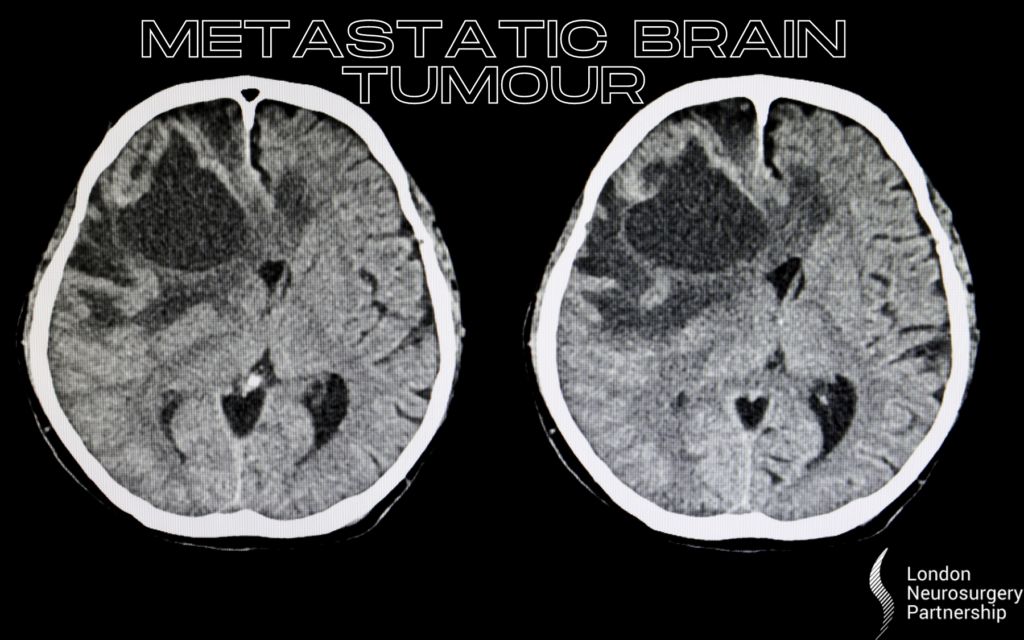
A metastatic brain tumour means cancer cells has spread through the bloodstream or the lymph system from its original tumour site and in to the brain and multiplies, metastasis is also called a secondary brain cancer. Occurring in around 10-30 percent of adults with cancer, metastasis can sometimes even be found before the primary tumour has been diagnosed.
Some types of primary cancer this is more likely to become a metastatic brain tumour are:
- Breast cancer
- Lung cancer
- Kidney cancer
- Skin cancer (melanoma)
- Bowel cancer
Metastatic cancer are the most common type of brain cancer which means you are 10 times more likely to be diagnosed with a metastatic cancer than a glioma or meningioma that are found in the brain.
It is often found that metastatic brain tumours do not show any signs or symptoms and in most cases a metastasis is found during routine scanning for the primary cancer in another area of the body.
When the metastatic cancer enlarges it begins to cause pressure to the brain by pushing against other parts of the area, this can cause symptoms such as:
- People may experience trouble walking, clumsiness and weakened coordination
- People may experience weakness or numbness on one side of the body
- People may experience trouble with speech and facial movement
- People may experience increased or constant headaches
- People may experience changes in vision and vomiting
- People may experience seizures
Diagnosing and treatment options
Your doctor may want to test you for metastatic cancer if you have either had cancer before, there is more than one tumour in the brain (primary tumours can only affect one area of the brain) or a secondary cancer has been found in other places.
Neurological examination – a neurological examination is a pain-free and simple exam performed by your consultant during a visit. He will test:
- Strength of your arms and legs by asking you to push against something, usually his hand
- Your reflexes by tapping your arms and legs with an object
- Pinpricks to test the ability to feel
- Look for swelling or increased pressure in the skull by shining a list
- Asking you questions to test your memory
- Hearing and eye sight tests
- Walking or actions to test your balance
MRI brain scan – MRI scanning for metastatic cancer is an advanced and excellent way of diagnosing brain cancer; it is able to use a detailed picture of your brain and usually takes around 30 minutes. Sometimes a contrast dye is injected into your arm for the scan which allows the radiographers to see certain areas of the brain in a more clear and detailed way.
MRI CT scan – CT scanning for metastatic canceris able to take a 3D picture of your brain to provide detailed images of your brain, it can see soft tissues, blood vessels, slices of bones and are more detailed than x-rays.
A biopsy can be taken before or during surgery to remove the metastatic cancer, this will confirm the cancer and can be performed using a needle.
Once a diagnosis has been made your consultant will talk you through all the options necessary. If diagnosed early metastatic cancer usually responds to therapy and treatment what can slow-growth and increase life expectancy.
Treatment options available for metastatic cancer are:
- Medication
- Stereotactic radiosurgery
- Whole-brain radiation therapy
- Chemotherapy
- Immunotherapy
- Surgery
Your consultant will indicate what treatment option is best for you and put you on a treatment plan. If you have been diagnosed with metastatic cancer please do not hesitate to contact our office and book an appointment with one of our consultants.
This article is intended to inform and give insight but not treat, diagnose or replace the advice of a doctor. Always seek medical advice with any questions regarding a medical condition.





0 Comments